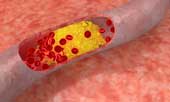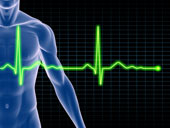ScienceDaily - 08-May-2014

A new study challenges research data that form the scientific basis of clinical trials in which heart attack patients are injected with stem cells to try and regenerate damaged heart tissue. Researchers report that cardiac stem cells used in ongoing clinical trials -- which express a protein marker called c-kit -- do not regenerate contractile heart muscle cells at high enough rates to justify their...
Medical News Today - 08-May-2014

New research exploring the potential effects of Hass avocado consumption on emerging cardiovascular disease (CVD) risk factors was presented at the American Society for Nutrition Scientific Sessions......
Medical News Today - 08-May-2014

Oily fish are currently recommended as part of a heart healthy diet. This guideline is partially based on the landmark 1970s study from Bang and Dyerberg that connected the low incidence of coronary......
Medical News Today - 08-May-2014

Alterations in the ubiquitin proteasome system (UPS), which tags proteins for degradation, underlies some cardiomyopathies and age-related cardiac dysfunction....
Medical News Today - 08-May-2014

Scientists have shown that anger, anxiety, and depression not only affect the functioning of the heart, but also increase the risk for heart disease....
Medical News Today - 08-May-2014

Scientists have shown that anger, anxiety, and depression not only affect the functioning of the heart, but also increase the risk for heart disease....
ScienceDaily - 08-May-2014

Tom Guynes considers himself a living miracle. He’s been treated for a typically fatal form of fast-spreading cancer, congestive heart failure, and a hernia all in the past two years. So when he suffered a stroke the morning of Nov. 24, 2013, both he and his wife Nan feared the worst. The patient was treated with an endovascular procedure to remove his blood clot through a procedure that involves sucking...
ScienceDaily - 07-May-2014

The way that your heart rate increases in response to alertness in the brain has been recently discovered by researchers. Specifically, this study looked at the interactions between neurons that fire upon increased attention and anxiety and neurons that control heart rate to discover the "why," "how," and "where to next" behind this phenomenon. The results may have important implications for how certain...
ScienceDaily - 07-May-2014

Investigators – whose previous research showed that cardiac stem cell therapy reduces scarring and regenerates healthy tissue after a heart attack in humans – have identified components of those stem cells responsible for the beneficial effects. In a series of laboratory and lab animal studies, researchers found that exosomes, tiny membrane-enclosed "bubbles" involved in cell-to-cell communication,...
Health.am - 06-May-2014
The U.S. Food and Drug Administration on Monday questioned the value of taking aspirin to try to ward off a first heart attack or stroke in people who have never had cardiovascular problems. The FDA’s statement follows its decision last week to turn down a request by German drugmaker Bayer AG to change the labeling on packages in order to market aspirin’s value in preventing heart attacks in people...
Medical News Today - 06-May-2014

The risk of heart attack rises as we age. But new research suggests that for those aged 65 and over, this risk can be reduced if physical activity is maintained or increased....
Medical News Today - 06-May-2014

New findings from an in vitro study, led by researchers at Brigham and Women's Hospital (BWH), show that the combination of statins and eicosapentaenoic acid (EPA), an omega-3 fatty acid, may......
Medical News Today - 06-May-2014

Traditional first-line checks of such heart disease risk factors as cholesterol, blood pressure and smoking habits aren't nearly good enough to identify cardiovascular disease in otherwise healthy......
ScienceDaily - 06-May-2014

The world's smallest pacemaker has been implanted as part of a global clinical trial. The procedure was the first of its kind in the United States Midwest. One-tenth the size of a conventional pacemaker, and comparable in size to a large vitamin, the Micra TPS pacemaker is delivered directly into the heart through a catheter inserted in the femoral vein. ...
ScienceDaily - 06-May-2014

Phosphate-rich foods include processed cheese, Parmesan, cola, baking powder and most processed foods. Phosphates are widely used in the food industry as preservatives and pH stabilizers. When large quantities of phosphates are consumed, production of the FGF23 hormone is stimulated, which has a negative effect on the cardiovascular system. One expert warns that “our phosphate consumption is relevant...
ScienceDaily - 06-May-2014

Stakes are higher for women with PAD, a circulation issue that's common among older adults. But women benefit just as much as men from procedures to unclog arteries. A new study demonstrates the need for doctors to ask women about leg discomfort and to screen for peripheral artery disease. PAD happens when fatty deposits build up in arteries outside the heart, usually the arteries supplying fresh oxygen...
ScienceDaily - 06-May-2014

Scientists have shown that anger, anxiety, and depression not only affect the functioning of the heart, but also increase the risk for heart disease. Stroke and heart attacks are the end products of progressive damage to blood vessels supplying the heart and brain, a process called atherosclerosis. Atherosclerosis progresses when there are high levels of chemicals in the body called pro-inflammatory...
ScienceDaily - 06-May-2014

Lowering copayments for cardiovascular medications results in better adherence and outcomes among all patients, research shows. But until now, little was known about whether lowering copayments could improve known disparities in cardiovascular care. New research finds that lowering copayments for medications following a heart attack could have a significant impact on reducing the racial and ethnic...
ScienceDaily - 06-May-2014

Maintaining or boosting your level of physical activity after age 65 can improve your heart's electrical well-being and lower your risk of heart attack. In heart monitor recordings taken over five years, researchers found that people who walked more and faster and had more physically active leisure time had fewer irregular heart rhythms and greater heart rate variability than those who were less active....
ScienceDaily - 06-May-2014

Reserach reveals how cells that form the heart in developing embryos are guided to move into the correct place. It is hoped that the findings will help researchers better understand how congenital heart defects happen during the early stages of pregnancy. The heart is the first functioning organ to develop in humans, and correct formation is crucial for embryo survival and growth. ...














